Digital Business Market Agenda for 2022: Resilience and Readiness
With the announcement of Ventana Research’s 2022 Market Agenda, our expertise in Digital Business continues to advance the market need for effective investments into technology, and I will outline here the key areas of focus to provide insights to organizations that can increase their organizational resilience and workforce readiness. We are proud to provide expertise on ensuring technological effectiveness through our market research and experience in providing guidance on trends and best practices.
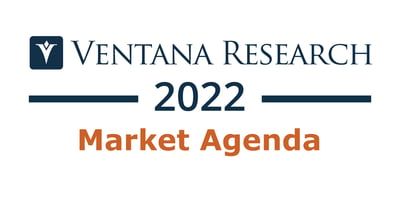 Digital business helps organizations ensure digital technology investments are effective, supporting the agility required for continued, successful operations every day of the year. Achieving the level of refinement to ensure business continuity requires a digital strategy that can sustain any market disruption. And for many organizations, the digital transformation intended to provide guidance on the strategy and effectiveness of applications and systems operating across private and public technology environments has had its challenges. The decades-long effort to continuously introduce technology that transforms the way organizations operate has had success but also failed to ensure readiness to operate under duress and ensure business continuity.
Digital business helps organizations ensure digital technology investments are effective, supporting the agility required for continued, successful operations every day of the year. Achieving the level of refinement to ensure business continuity requires a digital strategy that can sustain any market disruption. And for many organizations, the digital transformation intended to provide guidance on the strategy and effectiveness of applications and systems operating across private and public technology environments has had its challenges. The decades-long effort to continuously introduce technology that transforms the way organizations operate has had success but also failed to ensure readiness to operate under duress and ensure business continuity.
“Virtual Business” was challenged in many dimensions in 2021, from the satisfaction and retention of the workforce to ensuring that processes could be digitally enhanced across the organization. Operating and living through “black swan” events - like the pandemic - has proven to be challenging to sustain through these abnormal conditions and duress. Unfortunately for many organizations, the result has been problematic with increased staff turnover and difficulty finding talent and replacements that meet existing compensation guidelines. This significant disruption has impacted organizations and while the virtual workplace for part of the workforce has continued, the uncertainty in its continuation by management without effective communications has left many with the belief that maybe there are other places to potentially work. This lack of communication and readiness highlights the need for a more refined strategy in 2022, ensuring an environment where the business and technology dimensions of an organization’s digital strategy are aligned.
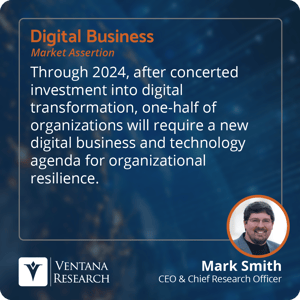 For 2022, we will continue to advance the necessity to ensure an effective digital business environment where business and technology leaders will need to continue their investment of resources and budget to address the need for continuous improvement. We assert that through 2024, after concerted investment into digital transformation, one-half of organizations will require a new digital business and technology agenda for organizational resilience. It is time for a concerted transformational effort to perfect the digital effectiveness of your organization, where technology links the business priorities and key objectives of the organizational readiness and workforce resilience.
For 2022, we will continue to advance the necessity to ensure an effective digital business environment where business and technology leaders will need to continue their investment of resources and budget to address the need for continuous improvement. We assert that through 2024, after concerted investment into digital transformation, one-half of organizations will require a new digital business and technology agenda for organizational resilience. It is time for a concerted transformational effort to perfect the digital effectiveness of your organization, where technology links the business priorities and key objectives of the organizational readiness and workforce resilience.
Our Digital Business expertise includes nine areas of focus: Business Continuity, Digital Communications, Digital Payments, Digital Security, Experience Management, Governance and Risk, Performance Management, Sustainability Management and Work Management.
Business Continuity
Business continuity and required planning help organizations define a strategy to successfully weather any market disruption. The practical reality is that most organizations lack the level of rigor necessary to ensure ongoing operations across every line of business - not just the IT operation. And this has created challenges where, by 2024, one-third of organizations will embrace business continuity planning to align digital technology investments to meet the demand of a virtualized customer, product and workforce environment.
For 2022, we will explore the processes that organizations are taking to ensure the resilience of their digital strategies, including the portfolio of applications and technology in use and the fundamentals for evaluating existing and future investments. Our market research will identify best practices and assess and rate vendors’ potential to help ensure the right technology is deployed. Our dedicated focus of expertise ensures insights and guidance about the aspects of digital technology necessary to sustain business operations.
Digital Communications
Digital communications enable the organization and workforce to efficiently interact and collaborate with its customers, partners and suppliers in a secure manner. Our agenda reflects our work to assess technology and guide organizations’ use of a range of communication methods - from unified communication and videoconferencing to communication platforms as a service - that are converging into what we call digital communications. Unfortunately, by 2025, two-thirds of organizations will realize that enterprise-wide digital communications do not satisfy workforce expectations, resulting in decreased productivity and worker engagement.
The rapid adoption across the enterprise of a wide range of technologies supporting communication and collaboration have created disruptions that require a unified approach for organizational readiness. We will examine the impact of using analytics with artificial intelligence and machine learning (AI/ML) to identify enhanced methods of effective communication. We will also consider the intersection of digital communication with other applications and tools needed for collaboration and operations. Whether worker, manager or others that need to interact, enhanced technology must facilitate an engaging work experience. Our market research is designed to produce best practices and insights on technology that helps organizations evaluate and prioritize digital communication options.
Digital Payments
Organizations are improving how to make it easier to conduct business with them, and payments of any manner are not always designed for efficiency between the parties involved and legacy investments from prior management in finance and technology have hampered their effectiveness. To be effective, organizations should make Digital Payments as efficient as possible. As the transfer of goods, services for their financial value in exchange for something similar in return that is agreed upon the parties involved is at the essence of what business is all about. The evolution of digital payments has been occurring over multiple decades, but the majority of organizations have not enabled the use of more recent technology to streamline finance or revenue interactions across every buying and selling channel. This includes the digital currencies and exchanges that are changing the way that monetary interactions have historically been conducted.
To optimize the impact of digital payments requires the ability to securely govern the processes and technology investments with customers across all buying and selling channels. This includes the digital identity of the parties, and our assertion is that by 2025, one-third of organizations will establish digital identity technology platforms to streamline the security of digital payment processes. Our market research on digital payments will investigate the processes and technologies that can transform organizations’ ability to operate in the most expedited and secure manner possible.
Digital Security
An effective digital security strategy is essential to comprehensively address what has historically been a bifurcated approach to cyber and information security. These processes need to be embedded and governed across all digital technologies. Our market agenda focuses on the importance of comprehensive digital security as an essential priority to protect the people, processes and assets - including intellectual property - of an organization.
Our examination of digital security will explore how dedicated technologies have evolved to ensure proper governance and risk mitigation necessary to operate in distributed organizations with disparate supporting systems, across hybrid-computing environments removed from a once-managed data center. The effective application of best practices can guide the integration and interconnection of these operations, while addressing security risks through technological advancements.
Our market research on digital security will examine the lessons learned from 2021 - and earlier - that still plague digital technology across the enterprise, including applications for customers and partners. We will evaluate new methods for human-to-machine and machine-to-machine verification that use identity and presence to best secure people and assets. We assert that through 2024, over two-thirds of organizations will converge their cyber and information security efforts into digital security programs to ensure effective governance and protection of physical and digital assets.
Experience Management
Digital experiences across every line of business and process should be the focal point for continuous improvement to enable effective and rewarding experiences for the workforce, customers, and products and services. Our focus on experience management is intended to ensure the effectiveness of all processes and technologies used to increase the impact of investments. This focused approach to experiences can enable marketing, sales and supply-chain service agents to distinguish their operations in a differentiated manner.
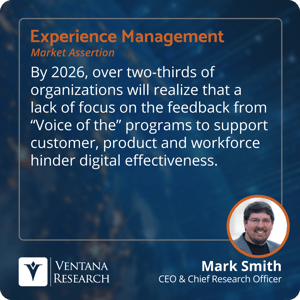 It is ineffective to focus solely on the customer experience as the entire journey and lifecycle. Managing the experience of everyone in the organization - and all constituents supporting this imperative - is key to measuring and improving the economic value of these interactions. We assert that by 2026, over two-thirds of organizations will realize that a lack of focus on the feedback from “Voice of the” programs intended to support customer, product and workforce hinder digital effectiveness. The necessity of experiences to guide the people and process engagement design elements - as well as the digital and technological components - are essential for the corporate brand as well as the human connection. Our market research will guide organizations’ needs, plans and attitudes on experiences for enterprise-focused, as well as specific business-focused, areas of expertise.
It is ineffective to focus solely on the customer experience as the entire journey and lifecycle. Managing the experience of everyone in the organization - and all constituents supporting this imperative - is key to measuring and improving the economic value of these interactions. We assert that by 2026, over two-thirds of organizations will realize that a lack of focus on the feedback from “Voice of the” programs intended to support customer, product and workforce hinder digital effectiveness. The necessity of experiences to guide the people and process engagement design elements - as well as the digital and technological components - are essential for the corporate brand as well as the human connection. Our market research will guide organizations’ needs, plans and attitudes on experiences for enterprise-focused, as well as specific business-focused, areas of expertise.
Governance and Risk
For organizations to be effective in what has historically been called governance, risk and compliance (GRC), it is critical to examine the proper placement of these practices relative to finance, operations and IT processes. Effective governance requires the knowledge of a group of professionals, and potentially a center of excellence, to ensure organization-wide best practices and compliance with policies and regulatory guidelines across geographic and statutory requirements.
Significant advancements in digital technology provide an opportunity to identify and invest in new methods that enable streamlined governance and risk mitigation throughout the organization. One area of improvement is in the use of analytics where, in 2025, the lack of risk metrics used in decision-making processes by two-thirds of organizations will contribute to declined performance and lack of organizational readiness. Instrumenting workflow and policy-focused technology can help ensure tasks and activities are handled according to corporate and regulatory guidelines. Our market research will provide guidance on the essential technologies required to ensure that digital business is focused on the impact and value from operations, while minimizing the cost and time required to address the governance and risk requirements.
Performance Management
Performance management is the process of efficiently linking an organization’s strategies and tactics with operations for desired outcomes. This fundamental approach to managing to objectives and key results has experienced a new resurgence. We assert that through 2025, one-third of organizations will determine the lack of performance management within business units has led to sub-optimization that does not contribute to overall improvement.
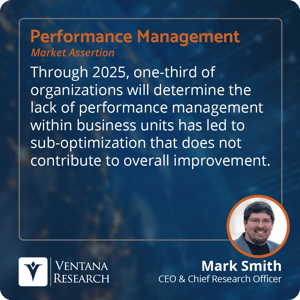 The complexities of digital business are creating new challenges for organizations’ ability to ensure alignment to the desired outcomes and performance within the time periods desired. This can be accomplished with dedicated applications designed for performance management across the workforce, supporting organizational goals for aligning work to the objectives of the organization.
The complexities of digital business are creating new challenges for organizations’ ability to ensure alignment to the desired outcomes and performance within the time periods desired. This can be accomplished with dedicated applications designed for performance management across the workforce, supporting organizational goals for aligning work to the objectives of the organization.
Advancements in digital technology - from analytics to AI and ML - have accelerated the potential to gather intelligence to guide performance management processes that can detect variances and issues impacting overall outcomes. Our market research will help organizations identify the best methodologies and processes in applications that adapt to the requirements for performance management. Combined with other advancing digital technologies like collaborative and conversational computing and mobile technology expectations, these applications can deliver the desired experience.
Sustainability Management
Sustainability management centers on promoting a balance in the mission of profitability and efficiency with the need to protect the environment. Success requires that leaders address the objectives for sustainability through planning and analytics, using dedicated applications that can best identify areas for change. By 2025, one-quarter of organizations will not be able to achieve sustainability management objectives without the need for environmental social governance (ESG) applications required to sustain continuous improvement.
The span of sustainability management is not only limited to the direct activities and operations of an organization but also includes those of the extended supply chain - the activities of anyone associated with the initiative. The science behind analytics and data to calculate the organization’s carbon footprint, for example, requires incorporating competencies, skills and knowledge from the industry into the organization.
For many organizations, the disparate activity to market the corporate sustainability efforts does not necessarily translate to the processes and technology that support the initiative. The importance of a dedicated team that works collaboratively across the organization to address change must be managed through an effective portfolio and work management to ensure that progress is made over time.
Our continuous market research will examine best practices and the technological impact of sustainability management. Our expertise will help organizations prioritize technology and vendors to focus on the necessary sustainability processes that can ensure adequate progress.
Work Management
Work management is the integration of tools and methods that enable workers to conduct tasks and activities to a desired and timely outcome in an efficient manner. It is not simply about being productive - it encompasses the experience of how work is done digitally to meet business objectives.
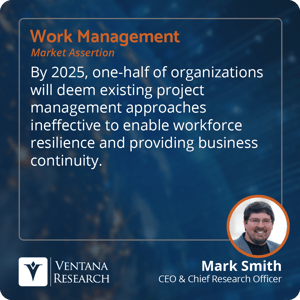 While this might seem obvious, most of the software organizations currently use was not designed around the experience of using it but rather focuses on the utility of what it accomplishes. This emphasis on productivity can have the unintended consequence of negatively impacting the effectiveness of the software. We assert that by 2025, one-half of organizations will deem existing project-management approaches ineffective to enable workforce resilience and providing business continuity.
While this might seem obvious, most of the software organizations currently use was not designed around the experience of using it but rather focuses on the utility of what it accomplishes. This emphasis on productivity can have the unintended consequence of negatively impacting the effectiveness of the software. We assert that by 2025, one-half of organizations will deem existing project-management approaches ineffective to enable workforce resilience and providing business continuity.
As organizations look to engage the workforce in the structured work of projects and unstructured guidance on tasks, the juncture of these is where the opportunity lies to simplify work and guide it to expected outcomes. This concept applies to work conducted in customer-facing areas across sales and service; marketing and operations that support front-office activities; or IT, manufacturing and supply-chain activities that are more structured and require a heightened sense of detail and governance. Our continuous market research will identify the rapidly evolving best practices in the use of task and program management, blended with collaborative computing, to provide an engaging work experience across the entire organization.
Every organization, no matter the industry or size, is a digital business capable of improving areas that impact organizational agility and support the needs of the workforce. While it is essential to place a priority on the digital experience, the fundamentals lie in the focus of the business and applications that enable an organization to balance priorities holistically to ensure the readiness and resilience of the organization.
Once an organization establishes priorities for how it will focus its digital business investments, the path forward will become clear. Desired outcomes will be achieved with effective preparation and strategy to the organizational readiness and workforce resilience required. To ensure your path for 2022 and beyond is on course with the right digital priorities, use this expertise and these focus areas as a filter for your own organizational efforts.
Subscribe to our Ventana Research community at no cost to stay up to date on our 2022 research efforts. Check out our Digital Business expertise and focus areas for the detailed agenda and continuously updated 90-day calendar as well as more research facts and best practices.
Regards,
Mark Smith

Mark Smith
Partner, Head of Software Research
Mark Smith is the Partner, Head of Software Research at ISG, leading the global market agenda as a subject matter expert in digital business and enterprise software. Mark is a digital technology enthusiast using market research and insights to educate and inspire enterprises, software and service providers.









